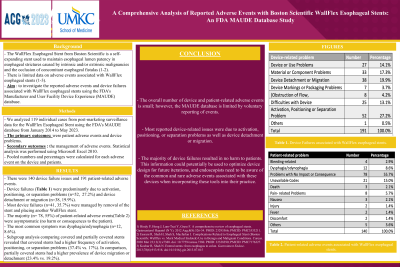Sunday Poster Session
Category: Esophagus
P0388 - A Comprehensive Analysis of Reported Adverse Events With Boston Scientific WallFlex Esophageal Stents: An FDA MAUDE Database Study
Sunday, October 22, 2023
3:30 PM - 7:00 PM PT
Location: Exhibit Hall


Fouad Jaber, MD
University of Missouri-Kansas City
Kansas City, MO
Presenting Author(s)
Fouad Jaber, MD1, Saqr Alsakarneh, MD1, Azizullah Beran, MD2, Laith Numan, MD, MS3, Mohammad Jaber, MD4, Thaer Abdelfattah, MD, MPH5, Rasheed Musa, MD6, Manasik Abdu, MD7, Abubaker Abdalla, MD8, Mohamed Ahmed, MD1, Samuel Igbinedion, MD9, Ahmad Najdat Bazarbashi, MD10
1University of Missouri-Kansas City, Kansas City, MO; 2Indiana University, Indianapolis, IN; 3Saint Louis University, St. Louis, MO; 4Al-Azhar University, Gaza, Palestinian Territories; 5Allegheny Health Network, Pittsburgh, PA; 6East Tennessee State University, Johnson City, TN; 7University at Buffalo-Catholic Health System, Buffalo, NY; 8Emory University, Atlanta, GA; 9Center for Advanced Endoscopy, Beth Israel Deaconess Medical Center, Harvard Medical School, Boston, MA; 10Washington University School of Medicine in St. Louis, St. Louis, MO
Introduction: The WallFlex Esophageal Stent from Boston Scientific is a self-expanding metal stent used to
maintain esophageal lumen patency in esophageal strictures caused by intrinsic and/or extrinsic malignancies and the occlusion of concomitant esophageal fistulas. While data on the efficacy and safety of esophageal stents exist, comprehensive evaluation of adverse events are limited. The aim of this study is investigate the reported adverse events and device failures associated with WallFlex esophageal stents using the FDA's Manufacturer and User Facility Device Experience (MAUDE) database.
Methods: Data were analyzed from post-marketing surveillance data for the WallFlex Esophageal Stent ( both fully and partially covered) using the FDA's MAUDE database from January 2014 to May 2023. The primary outcomes were patient-related adverse events and intrinsic device malfunctions and/or failures. Secondary outcomes included the management of adverse events. Statistical analysis was performed using Microsoft Excel 2010. Pooled numbers and percentages were calculated for each adverse event on the device and patient.
Results: Over the timeframe of 10 years, only 140 device failures and 191 patient-related adverse events were reported. Device failures (Figure 1-A) were predominantly due to activation, positioning, or separation problems (n=52, 27.2%) and device detachment or migration (n=38, 19.9%). Most device failures were managed by removal of the stent and placing another WallFlex stent (n=41, 35.7%). The majority (n= 78, 55%) of patient-related adverse events (Figure 1-B) were asymptomatic (no harm or consequences to the patient). This is followed by no unviable codes (n=21, 15%), and dysphagia/odynophagia (n=12, 8.6%). Subgroup analysis comparing covered and partially covered stents revealed that covered stents had a higher frequency of activation, positioning, or separation problems (37.4% vs. 17%, p-value = 0.04). In comparison, partially covered stents had a higher frequency of device migration or detachment (23.4% vs. 19.2%, p-value = 0.07).
Discussion: The WallFlex stent has proven to be an effective device for the palliation and treatment of esophageal strictures with an overall low number of voluntary reported patient related adverse events or device malfunctions. This information should allow endoscopists to be more cognizant of device related malfunctions/failures and could potentially be used to optimize device design for future iterations.

Disclosures:
Fouad Jaber, MD1, Saqr Alsakarneh, MD1, Azizullah Beran, MD2, Laith Numan, MD, MS3, Mohammad Jaber, MD4, Thaer Abdelfattah, MD, MPH5, Rasheed Musa, MD6, Manasik Abdu, MD7, Abubaker Abdalla, MD8, Mohamed Ahmed, MD1, Samuel Igbinedion, MD9, Ahmad Najdat Bazarbashi, MD10. P0388 - A Comprehensive Analysis of Reported Adverse Events With Boston Scientific WallFlex Esophageal Stents: An FDA MAUDE Database Study, ACG 2023 Annual Scientific Meeting Abstracts. Vancouver, BC, Canada: American College of Gastroenterology.
1University of Missouri-Kansas City, Kansas City, MO; 2Indiana University, Indianapolis, IN; 3Saint Louis University, St. Louis, MO; 4Al-Azhar University, Gaza, Palestinian Territories; 5Allegheny Health Network, Pittsburgh, PA; 6East Tennessee State University, Johnson City, TN; 7University at Buffalo-Catholic Health System, Buffalo, NY; 8Emory University, Atlanta, GA; 9Center for Advanced Endoscopy, Beth Israel Deaconess Medical Center, Harvard Medical School, Boston, MA; 10Washington University School of Medicine in St. Louis, St. Louis, MO
Introduction: The WallFlex Esophageal Stent from Boston Scientific is a self-expanding metal stent used to
maintain esophageal lumen patency in esophageal strictures caused by intrinsic and/or extrinsic malignancies and the occlusion of concomitant esophageal fistulas. While data on the efficacy and safety of esophageal stents exist, comprehensive evaluation of adverse events are limited. The aim of this study is investigate the reported adverse events and device failures associated with WallFlex esophageal stents using the FDA's Manufacturer and User Facility Device Experience (MAUDE) database.
Methods: Data were analyzed from post-marketing surveillance data for the WallFlex Esophageal Stent ( both fully and partially covered) using the FDA's MAUDE database from January 2014 to May 2023. The primary outcomes were patient-related adverse events and intrinsic device malfunctions and/or failures. Secondary outcomes included the management of adverse events. Statistical analysis was performed using Microsoft Excel 2010. Pooled numbers and percentages were calculated for each adverse event on the device and patient.
Results: Over the timeframe of 10 years, only 140 device failures and 191 patient-related adverse events were reported. Device failures (Figure 1-A) were predominantly due to activation, positioning, or separation problems (n=52, 27.2%) and device detachment or migration (n=38, 19.9%). Most device failures were managed by removal of the stent and placing another WallFlex stent (n=41, 35.7%). The majority (n= 78, 55%) of patient-related adverse events (Figure 1-B) were asymptomatic (no harm or consequences to the patient). This is followed by no unviable codes (n=21, 15%), and dysphagia/odynophagia (n=12, 8.6%). Subgroup analysis comparing covered and partially covered stents revealed that covered stents had a higher frequency of activation, positioning, or separation problems (37.4% vs. 17%, p-value = 0.04). In comparison, partially covered stents had a higher frequency of device migration or detachment (23.4% vs. 19.2%, p-value = 0.07).
Discussion: The WallFlex stent has proven to be an effective device for the palliation and treatment of esophageal strictures with an overall low number of voluntary reported patient related adverse events or device malfunctions. This information should allow endoscopists to be more cognizant of device related malfunctions/failures and could potentially be used to optimize device design for future iterations.

Figure: Table 1: Device Failures associated with WallFlex Esophageal Stents.
Table 2: Patient-related adverse Events associated with WallFlex Esophageal Stents.
Device or Use Problems (Adverse Event Without Identified Device or Use Problem, Human-Device Interface Problem, Use of Device Problem), Activation, Positioning or Separation Problem (Activation Failure, Activation, Difficult or Delayed Positioning, Positioning or Separation Problem, Positioning Failure, Positioning Problem), Material or Component Problems (Break, Material Deformation, Material Integrity Problem, Material Puncture/Hole), Device Detachment or Migration (Detachment of Device or Device Component, Migration), Device Markings or Packaging Problems (Device Markings/Labelling Problem, Device Packaging ), Difficulties with Device (Difficult to Advance, Difficult to Remove. Pain related , Bleeding-related ( hematemesis/ Bleeding/hemorrhage), Problems with No Impact or Consequence (No Impact or Consequence, No Clinical Signs, Symptoms or Conditions, No Consequences Or Impact To Patient) others ( erosion, perforation, sedation, injury).
Table 2: Patient-related adverse Events associated with WallFlex Esophageal Stents.
Device or Use Problems (Adverse Event Without Identified Device or Use Problem, Human-Device Interface Problem, Use of Device Problem), Activation, Positioning or Separation Problem (Activation Failure, Activation, Difficult or Delayed Positioning, Positioning or Separation Problem, Positioning Failure, Positioning Problem), Material or Component Problems (Break, Material Deformation, Material Integrity Problem, Material Puncture/Hole), Device Detachment or Migration (Detachment of Device or Device Component, Migration), Device Markings or Packaging Problems (Device Markings/Labelling Problem, Device Packaging ), Difficulties with Device (Difficult to Advance, Difficult to Remove. Pain related , Bleeding-related ( hematemesis/ Bleeding/hemorrhage), Problems with No Impact or Consequence (No Impact or Consequence, No Clinical Signs, Symptoms or Conditions, No Consequences Or Impact To Patient) others ( erosion, perforation, sedation, injury).
Disclosures:
Fouad Jaber indicated no relevant financial relationships.
Saqr Alsakarneh indicated no relevant financial relationships.
Azizullah Beran indicated no relevant financial relationships.
Laith Numan indicated no relevant financial relationships.
Mohammad Jaber indicated no relevant financial relationships.
Thaer Abdelfattah indicated no relevant financial relationships.
Rasheed Musa indicated no relevant financial relationships.
Manasik Abdu indicated no relevant financial relationships.
Abubaker Abdalla indicated no relevant financial relationships.
Mohamed Ahmed indicated no relevant financial relationships.
Samuel Igbinedion indicated no relevant financial relationships.
Ahmad Najdat Bazarbashi indicated no relevant financial relationships.
Fouad Jaber, MD1, Saqr Alsakarneh, MD1, Azizullah Beran, MD2, Laith Numan, MD, MS3, Mohammad Jaber, MD4, Thaer Abdelfattah, MD, MPH5, Rasheed Musa, MD6, Manasik Abdu, MD7, Abubaker Abdalla, MD8, Mohamed Ahmed, MD1, Samuel Igbinedion, MD9, Ahmad Najdat Bazarbashi, MD10. P0388 - A Comprehensive Analysis of Reported Adverse Events With Boston Scientific WallFlex Esophageal Stents: An FDA MAUDE Database Study, ACG 2023 Annual Scientific Meeting Abstracts. Vancouver, BC, Canada: American College of Gastroenterology.
